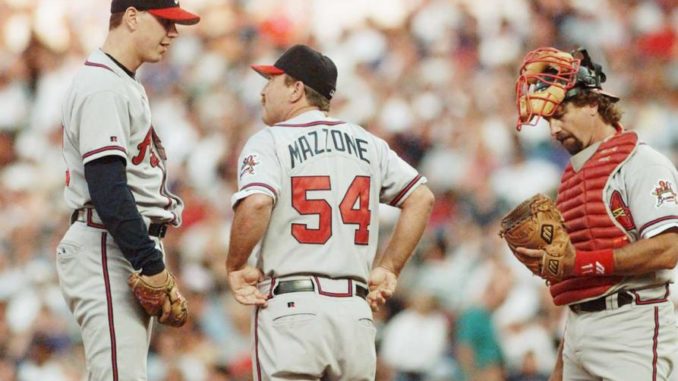
The Commissioner of Baseball these days is very concerned about the Pace of Play in the game. Apparently millennials as a group won’t watch baseball because it’s not as fast as MLB The Show, and thus the Death of the Game is just a generation away.
As my son would say, whatevs.
Today Major League Baseball implemented the only pace-of-play rule change for which they were able to get the Player’s Association’s buy-in. The intentional walk will no longer be a pitcher throwing four to a standing catcher well off the plate, but a sign from the dugout. This will shave approximately 1 minute of running time from every second or third game played. It will also eliminate the possibility of ever seeing plays like these:
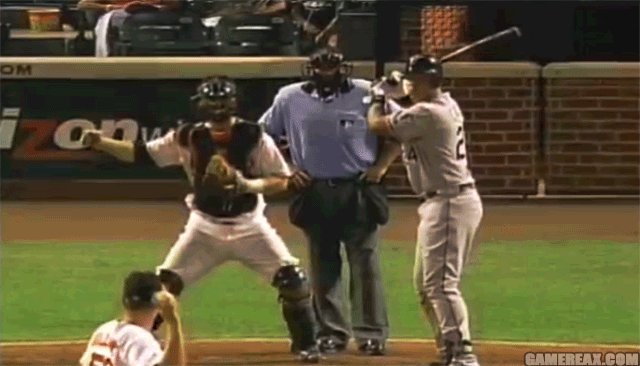


Yes, an intentional walk going wrong is a super edge-case in the area of potential on-field drama. It doesn’t matter. This is a rule change that creates a disconnect in the way the game has been played from the days of Kid Nichols and Old Hoss Radbourn to the game today. To put it bluntly, it’s the worst of options because it disrupts one of the greatest things about the game, it’s connection to history, and doesn’t actually solve anything at all.
If the Commissioner is really serious about improving Time of Game, here’s some ideas for some changes that could have an actual impact without interfering with the actual game. Some of these may actually enhance the tactical aspect game as well, which would help fan engagement. None of these ideas are original to me.
1. A Pitcher That Warms Up To Start The Inning Must Face At Least One Batter
This would be a rule change so obvious, you wonder why it hasn’t always been in the rulebook. There’s already a rule that a pitcher that comes into the game mid-inning must face at least one batter. Let’s take the next logical step. It will avoid this maddening, boring scenario:
- Pitcher warm up to start an inning.
- A pinch hitter is announced.
- The manager pulls the pitcher to go to a reliever for a better match-up.
Implementing this rule forces the manager to make a decision earlier… let my starter go out there, knowing that pinch hitter is lurking? Or do I have the reliever come out to warm-up, and maybe that pinch hitter stays on the bench… perhaps to be used later in the game? This gives broadcasters something to talk about, let’s fans watching think along with the manager, and ends the likelihood of a big disruption of play. Win-win-win.
2. Enforce Rule 8.04(c)
Here is the current major league rule to prevent a pitcher delaying.
When the bases are unoccupied, the pitcher shall deliver the ball to the batter within 12 seconds after he receives the ball. Each time the pitcher delays the game by violating this rule, the umpire shall call “Ball.”
The 12-second timing starts when the pitcher is in possession of the ball and the batter is in the box, alert to the pitcher. The timing stops when the pitcher releases the ball.
The intent of this rule is to avoid unnecessary delays. The umpire shall insist that the catcher return the ball promptly to the pitcher, and that the pitcher take his position on the rubber promptly. Obvious delay by the pitcher should instantly be penalized by the umpire
If this requires a pitch clock to aid umpires in enforcing this rule, MLB should install them. This is already done for minor league games, and only rarely is it even noticed. This flipside of this would be that batters should be prepared to hit within 12 seconds of the pitcher receiving the ball. If he’s not, he should get a strike called against him. It won’t happen, at least not often, because players will get used to it and get in line, as long as the umpires actually enforce it. The pitch clock should see to that.
Again, this rule doesn’t change anything about the game between the lines.
3. Add a 5th Umpire To Each Team To Instantly Review Plays
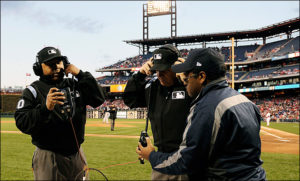
I have been a proponent of instant replay in baseball. I hate plays that are called incorrectly. It offends by sense of fairness that someone who does something right is not rewarded for their efforts. For that reason, I am generally predisposed to like the concept of instant replay review in baseball.
That said, there’s a lot to be said about the way baseball has gone about implementing instant replay. The challenge system delays the game as the dugout decides to challenge a play or not, though a ruling today at least enforces a 30-second time limit for that decision. If there is a challenge, there’s a delay as the umpires huddle up and contact the review officials in New York. Then the actual review occurs. It’s slow, it kills the momentum of the game, and it’s easily avoidable.
The solution is a 5th umpire on site, watching the game live, and with easy communication to the head umpire on the field. He signals to the field when we want to review something. He reviews it, He gives a confirmed or overturned signal. The game continues.
It’s such an obvious improvement, the only reason I can think of as to why it’s not already implemented is that the Commissioner doesn’t want to have to pay another 15 umpires.
4. Give Each Team Three Manager Time-Outs
There’s a lot of talk about somehow limiting the number of relievers that can be used in a game. Quite frankly, I don’t find the use of relievers that big of a deal. What’s disruptive to the flow of the game is coach visits, then mid-inning pitching changes.
This change would force the dugouts to utilize time-saving methods of communication. More signs, less jogging out to the mound, and pitchers shouldn’t need to have the pitching coach come out to remind him what the scouting report is on a hitter. It will also limit mid-inning pitcher substitutions to three a game.
5. Allow Ties
The most radical suggestion I like is allowing a game that goes into extra innings to die in a tie score. This almost violates the aim of not changing the game in such a way as to break continuity with baseball history, but it really does nothing to disrupt the game as played between the lines. Every other sport allows for ties, it’s time baseball did too. I suggest calling the game after the 12th inning.
There has been a suggestion that MLB follow international tournament rules and start each extra inning with a baserunner on second base. I cannot express how horrible I think this rule is. Getting on base should be hard. Not to mention, it’s boring. Every extra inning will conform to the same formula.
Batter 1: sac bunt
Batters 2 & 3: try to hit it to the outfield
I’d rather just turn off the TV.
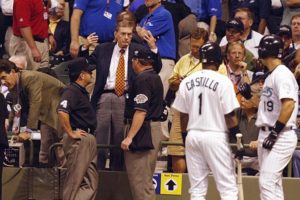
So there you have it, five suggestions to reduce Time of Game. When it’s all said and done however, none of this will likely make new fans. Good players, team parity, access to games on television and on-line, expanding access to organized play for more kids, and more World Series like the one we just had will do far more to that end than any of these rules.
But that sounds hard, so we’ll probably get runners on second in extra innings.
Bunt.

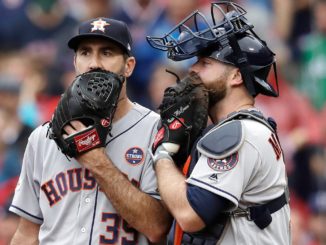
Leave a Reply